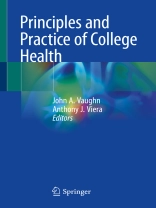This unique and comprehensive title offers state-of-the-art guidance on all of the clinical principles and practices needed in providing optimal health and well-being services for college students.
Designed for college health professionals and administrators, this highly practical title is comprised of 24 chapters organized in three sections: Common Clinical Problems in College Health, Organizational and Administrative Considerations for College Health, and Population and Public Health Management on a College Campus. Section I topics include travel health services, tuberculosis, eating disorders in college health, and attention deficit hyperactivity disorder among college students, along with several other chapters. Subsequent chapters in Section II then delve into topics such as supporting the health and well-being of a diverse student population, student veterans, health science students, student safety in the clinical setting, and campus managementof infectious disease outbreaks, among other topics. The book concludes with organizational considerations such as unique issues in the practice of medicine in the institutional context, situating healthcare within the broader context of wellness on campus, organizational structures of student health, funding student health services, and delivery of innovative healthcare services in college health.
Developed by a renowned, multidisciplinary authorship of leaders in college health theory and practice, and coinciding with the founding of the American College Health Association 100 years ago, Principles and Practice of College Health will be of great interest to college health and well-being professionals as well as college administrators.
Table of Content
Section I. Common Clinical Problems in College Health.- Chapter 1. Campus Travel Health Services.- Chapter 2. Tuberculosis.- Chapter 3. Eating Disorders in College Health.- Chapter 4. Depression and Anxiety in College Students.- Chapter 5. Attention Deficit Hyperactivity Disorder and College Students.- Chapter 6. Athletic Medicine.- Chapter 7. Concussion.- Chapter 8. Contraception for College Reproductive Health.- Chapter 9. Sexual Health.- Section II. Population and Public Health Management on a College Campus.- Chapter 10. Supporting the Health and Well-Being of a Diverse Student Population.- Chapter 11. Student Veterans.- Chapter 12. Health Science Students.- Chapter 13. Student Safety in the Clinical Setting.- Chapter 14. Campus Management of Infectious Disease Outbreaks.- Chapter 15. Immunization Compliance Management.- Chapter 16. Nutrition Services.- 17. Sleep on College and University Campuses.- Chapter 18. Substance Use and Abuse: Alcohol, Tobacco, and Other Drugs.- Section III. Organization and Administrative Considerations for College Health.- Chapter 19. Unique Issues in the Practice of Medicine in the Institutional Context.- Chapter 20. Situating Healthcare Within the Broader Context of Wellness on Campus.- Chapter 21. Organizational Structures of Student Health.- Chapter 22. Funding Student Health Services.- Chapter 23. Delivery of Innovative Healthcare Services.- Chapter 24. Disability Access in Higher Education: Documenting as University Health Service Providers.
About the author
John A. Vaughn, MD
Director, Student Health Services
Associate Professor, Family Medicine and Community Health
Duke University
Durham, NC
Anthony J. Viera, MD, MPH
Professor and Chair
Department of Family Medicine and Community Health
Duke University
Durham, NC












